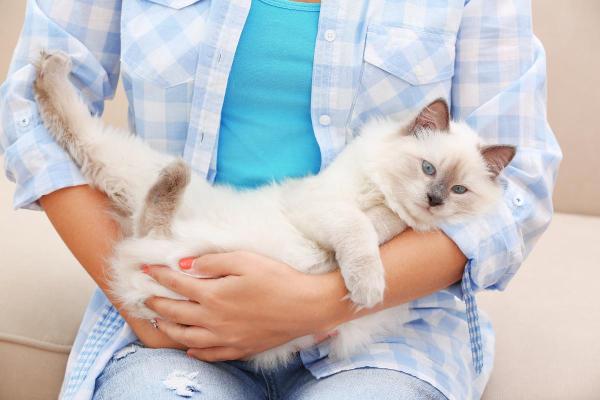Why Does My Cat Lay on Me and Purr?



See files for Cats
A cat purring on top of you is one of the most relaxing states in which we can find ourselves. The low hum of their contented purring benefits both cat and guardian, with the simple fact of spending time together encouraging their bond. The eagerness with which the cat will lay on top of their guardian can be quite touching. It can even be the case that cats which don't always enjoy being petted, will still sit on top of your for long periods. While this behavior can be very pleasant, it also says a lot about the cat's wellbeing.
At AnimalWised, we ask why does my cat lay on top of me and purr? Whether it is on your lap or your chest, we discover 7 reasons for cats purring next to you.
Why do cats purr?
Purring in cats is a unique vocalization and behavior that involves the production of a soft, rumbling sound. While the exact mechanisms of purring are not fully understood, it is a complex process that combines the coordination of various body structures and serves multiple purposes.
How do cats purr?
Although not well understood, we know a cat has specially developed muscles that allow them to purr which are controlled by the brain. Cats purr due to the following:
- Laryngeal muscles: purring is primarily associated with the rapid contraction and relaxation of the laryngeal (voice box) muscles. These contractions cause the vocal cords to open and close, producing the characteristic purring sound.
- Neural signals: neural signals from the brain regulate the contractions of the laryngeal muscles. These signals are generated by a specific neural oscillator, which stimulates the muscles to contract rhythmically.
- Frequency: cats typically purr at a frequency of 25 to 150 vibrations per second (Hz), which falls within the range believed to have potential therapeutic effects on various bodily functions.
Why do cats purr?
We will look at the specific reasons why a cat is purring on top of you in the sections below. However, there are some general reasons which explain purring in cats. They include:
- Contentment and relaxation: cats often purr when they are content and relaxed. It can be a sign that your cat is happy and comfortable in their environment. Kittens often purr when nursing to signal contentment to their mother. Although adult cats in the wild do purr, it is believed it is much more common in domestic cats.
- Stress or discomfort: cats may also purr when they are stressed, anxious or unwell. This is thought to be a self-soothing mechanism, as the vibrations generated by purring may have a calming effect on the cat's nervous system.
- Communication: cats can use purring as a means of communication. For example, a cat may purr to signal to their owner that they want attention, food or affection.
Purring is a complex behavior in cats that involves the rhythmic contraction of laryngeal muscles and serves various purposes. These are mostly related to communication, so we look at what a cat is specifically trying to communicate with us when they purr on top of or next to us.
They want to give and receive affection
One of the most common reasons a cat lays on top of you and purrs is also the most obvious. They want to show you affection. When we see a beloved cat, it is natural to want to give them affection by petting them. Cats cannot pet us in the same way, but they feel the same impetus. By laying on top of us, purring and rubbing against us, they are showing the same kind of affection they show toward other cats.
Only cats that feel safe and content with you will purr on your lap in this way. It is a sign of both the cat being content in the moment and their overall happiness with you as their reference figure. They also know you are more likely to give them affection if they purr on top of you. You can encourage this bond by petting them and providing treats while they are sitting on your lap.
Discover more signs a cat loves you in our related article.

They want to feel safe
The feline instinct for self-preservation is very strong. They have an innate need to maintain control in their environment, as well as to have a sold escape plan if anything becomes too intimidating to them. In the wild, felines climb trees and perch on other high up areas to survey the area and watch out for potential threats.
While our lap might not be as high as a tree, perching on our lap and purring is a way for a cat to do the same thing. This is the difference between a cat laying on our chest to rest and them sitting on us while looking out across the room. We not only provide a panorama for them to asses the safety of the home, but they are sitting on the person with whom they feel most secure.
They want to feel comfortable
If we are lying down ourselves, our cat may want to lay on our chest and purr. This is because we provide them with a very comfortable space to rest. While some of us may be more comfortable than others, our lap or chest can often be the perfect size for our kitty to rest. Moreover, we are a source of heat. If the ambient temperature is quite cool, sitting on top of us is a way the cat and rets comfortably and get a little heat.
Learn about other ways cats can make themselves comfortable with our list of the 10 most common cat hiding places.
They are marking us as family
Cats have several methods of marking their territory. The most unpleasant way is to spray with urine, although it is fortunately less common for a cat to pee on us. It is much more likely they will mark us with their scent glands.
These scent glands are located on various parts of the cat's body. They are found on their paws, enabling them to mark when they scratch. They are also on the face and flanks, so cats mark when they rub against us. They will often purr while they do so, showing the cat is both familiar with us and wants to ensure other cats know we are family.
They want your attention
When a cat sits on our lap and purrs, it is only the hardest hearted that can resist petting them and providing them with some affection. Many of us will also reinforce this behavior with rewards such as a treat or we will initiate a play session. Cats learn when being with their human guardians. They judge their actions and internalize that certain behaviors will elicit certain responses. A cat purring on your lap may be doing so to get your attention.
Although purring in this way is normal and healthy behavior, it can be a sign of an issue in the relationship between cat and owner. If the cat keeps seeking your attention, it may be they are not receiving enough. Each cat has their own requirements for physical and mental stimulation. If they keep seeking us out, it is important we pay attention to ensure their needs are being met.
Learn about other ways cats petition for our attention with our article on why my cat meows when they see me.
They do it out of habit
Sometimes the trigger for why my cat purrs on top of me is simpler than we think. If we reinforce a cat purring on our lap or chest by giving them treats, petting them or generally providing affection, it should be no surprise they have become comfortable with this situation. Doing so is now part of the cat's routine and they look forward to it as a beneficial part of their day. Fortunately, it is a mutually beneficial experience for all involved.

They are sick
In the vast majority of cases, a cat will purr on top of us for positive reasons. Only in rare occasions might this be sign of a problem, but it is important to consider. When a cat is sick or in pain, purring can be a symptom of their illness. They purr as a way to show they are in discomfort and need help. It is related to the time when they are a kitten and they purr to get their mother's attention.
We should be able to notice the difference between a healthy and a sick cat purring on top of us. This is one of the reasons it is so important we spend quality time with our cat. Signs and symptoms of disease in cats are often quite subtle, so we need to pay close attention.
If we believe our cat is purring next to us because they are sick, it is vital we take them to a veterinarian for consultation. They will be best able to diagnose any problem and provide the correct course of treatment. It is also possible the cat is mentally unwell due to stress or anxiety. In these cases, the veterinarian might refer you to a feline ethologist who can assess the cat's situation and provide practical ways to help them.
Learn more about the reasons why cats are stressed in our related article.
If you want to read similar articles to Why Does My Cat Lay on Me and Purr?, we recommend you visit our Facts about the animal kingdom category.







